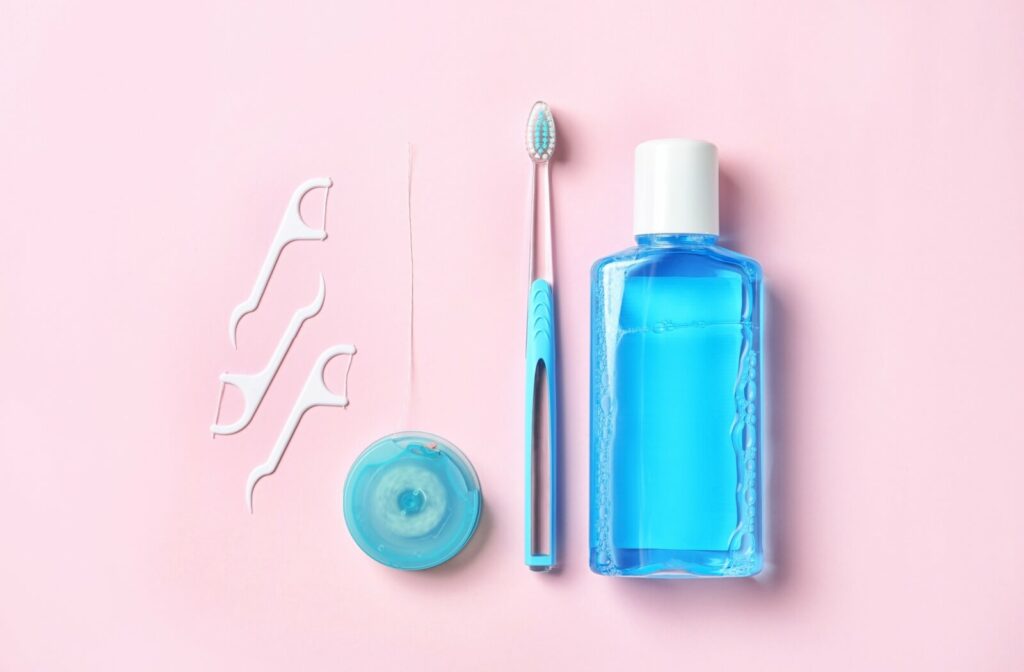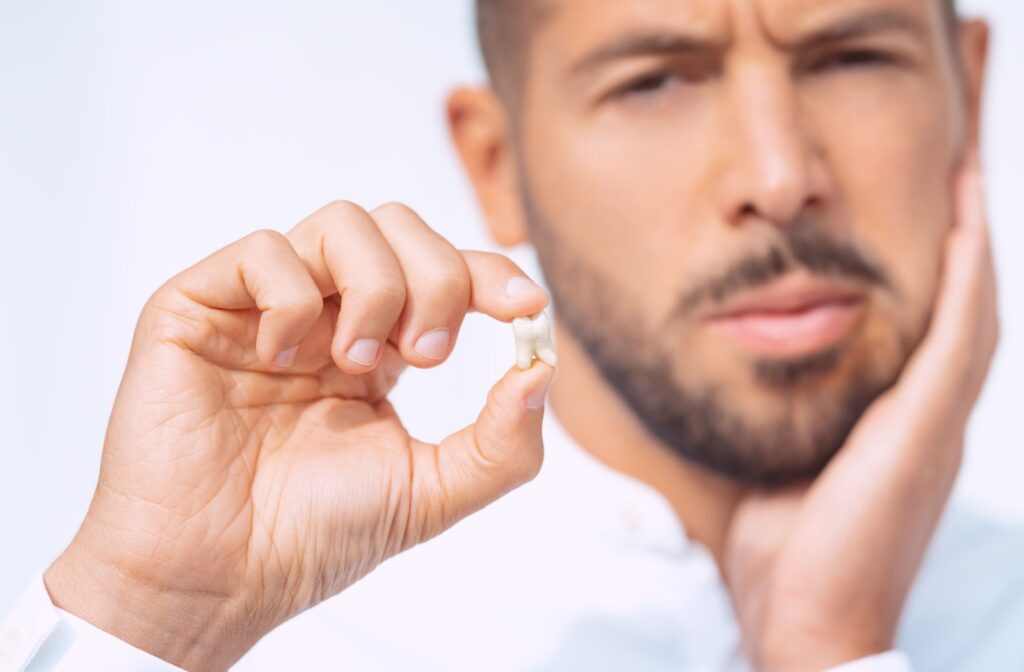Getting your wisdom teeth removed can feel like a big milestone. However, once the procedure is done, there’s often hesitation about what comes next in terms of oral care. This is especially true when it comes to how you should brush your teeth, as improper brushing—or not brushing at all!—can impede the healing process.
After a wisdom tooth extraction, you should rinse the site with saltwater for a few days instead of brushing. After this, it’s important to gradually reintroduce brushing into your oral hygiene routine.
At Shawnessy Dental Centre, our team is invested in the success of your oral surgery, so don’t hesitate to reach out if you have any questions!
What Happens During Wisdom Tooth Extraction?
Wisdom tooth extraction is a common oral surgery procedure that removes one or more of the third set of molars. These teeth, commonly called wisdom teeth, are the last to emerge, typically making their appearance between the ages of 17 and 25.
For some people, wisdom teeth grow in without any issue. For others, however, they can cause significant problems, such as overcrowding, impacted growth, or infections due to their hard-to-clean location at the back of the mouth.
During the extraction process, your dentist will numb the area with local anesthesia to ensure you’re comfortable, after which they’ll remove the wisdom teeth that need extraction. Once done, they’ll clean the area and may use dissolvable stitches to help with healing. The result? A gap in the gum where the tooth used to be—one that will take time to heal properly.
While the procedure is straightforward, the days following a wisdom tooth extraction require mindful care to ensure that healing goes smoothly. This is where your oral hygiene routine, including brushing, comes into play.
How to Brush Your Teeth After a Wisdom Tooth Extraction
Brushing your teeth after wisdom tooth extraction is important, but it calls for a delicate touch. It’s all about keeping the area clean without disturbing the healing process. Here’s how to do it:
- Wait 24 Hours Before Brushing
After your surgery, avoid brushing your teeth for the first 24 hours. This is when blood begins to clot in the socket where wisdom teeth were, and it’s a crucial part of the healing process. Disturbing this clot can lead to complications like dry socket, which you definitely want to avoid.
- Be Gentle & Use a Soft-Bristled Toothbrush
Once you resume brushing, choose a soft-bristled toothbrush to avoid irritating sensitive areas. Brush gently in all areas of your mouth, but avoid the surgical site for a few days.
- Skip Toothpaste at First
For the first 2-3 days, brush with just water instead of using toothpaste. This prevents bubbles or foam from getting into the extraction site, which could disrupt healing.
- Exercise Caution Near the Treatment Area
Even once you start using toothpaste again, do your best to avoid directly brushing over the extraction sites for about a week. Instead, gently clean the surrounding teeth and gum area without applying direct pressure.
- Rinse Carefully
Avoid vigorous rinsing. Instead, gently swish warm salt water around your mouth after meals to clean debris without using force that could dislodge the healing blood clot.
By following these steps, you can maintain a clean mouth without interfering with your recovery, but brushing isn’t the only thing to keep in mind. Establishing a few more practices can make a big difference.
How to Keep Your Mouth Healthy After Surgery

Aside from brushing, there are a few other ways to keep your mouth sparkling clean and healthy post-surgery without disrupting the healing process. Here’s what you need to know:
Flossing
Flossing doesn’t need to take a backseat entirely after wisdom tooth extraction—just approach it carefully. Focus on areas away from the surgical site, and avoid forcing the floss if your gums feel tender. Over time, as the affected area begins to heal, you can gradually reintroduce flossing to your entire mouth.
Mouthwash
Mouthwash can be useful, but timing is everything. Avoid using commercial mouthwash for at least a week after surgery, as the alcohol and other ingredients can irritate the extraction site. Instead, opt for a gentle rinse with warm (not hot!) salt water, which helps reduce bacteria while soothing inflammation. A saltwater rinse is easy to make—just dissolve 1 teaspoon of salt in 8 ounces of warm water.
Post-Surgery Aftercare Tips
Here are few additional aftercare tips to ensure your healing stays on track:
- Stay Hydrated: Drink plenty of water, but avoid using a straw, as the suction can dislodge the blood clot over the extraction site.
- Watch Your Diet: Stick to soft foods like yogurt, soup, or mashed fruit and vegetables, and avoid crunchy or hot foods that could irritate the wound.
- Rest: Give your body the time it needs to heal by avoiding strenuous activities for at least 48 hours after surgery, and avoid lifting anything heavy during this time, too.
Possible Complications From Wisdom Tooth Surgery
While most recoveries are smooth, complications can occasionally arise. Knowing the warning signs is important so you can act quickly if needed.
Here are some potential complications to watch out for:
- Dry Socket: This occurs when the blood clot at the extraction site is dislodged, exposing the nerves beneath and causing severe pain. This can happen from improper oral care, heavy rinsing, or using a straw too soon.
- Prolonged Swelling or Bleeding: Some swelling and bleeding are normal in the first 24–48 hours, but such symptoms should subside over the next few days. If they don’t, consult your dentist.
- Signs of Infection: Symptoms like fever, increasing pain, pus, or bad breath could indicate an infection, which will require prompt treatment.
If you experience any of these symptoms, don’t hesitate to contact your dentist for advice.
Recovery Is About Balance
Recovering from wisdom tooth extraction may feel like a lot, but the key is to strike a balance between maintaining good oral hygiene and giving your body the space to heal. Gentle brushing, careful flossing, and following these aftercare tips can help keep your mouth healthy and your recovery smooth.If you’re unsure about your post-surgery routine, our team at Shawnessy Dental Centre is here to help. Book your next appointment for personalized advice from one of our dental professionals. We’re here to help you have a pain-free and speedy recovery!


